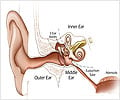According to a recent study, a person's listening abilities oscillate and depend on the exact timing of one's brain rhythms.

And researchers at the Max Planck Institute for Human Cognitive and Brain Sciences have found that this influences the way we listen.
To be able to track each listener's brain activity on a millisecond basis, Molly Henry and Jonas Obleser from the Max Planck Research Group "Auditory Cognition" recorded the electroencephalographic signal from listeners' scalps.
First, the researchers demonstrated that every listener's brain was "dragged along" (this is what entrainment, a French word, literally means) by the slow cyclic changes in melody; listeners' neural activity waxed and waned.
Second, the listeners' ability to discover the fleeting gaps hidden in the melodic changes was by no means constant over time. Instead, it also "oscillated" and was governed by the brain's waxing and waning. The researchers could predict from a listener's slow brain wave whether or not an upcoming gap would be detected or would slip under the radar.
Why is that? "The slow waxings and wanings of brain activity are called neural oscillations. They regulate our ability to process incoming information," Henry explained.
Advertisement
The researchers hope to be able to use the brain's coupling to its acoustic environment as a new measure to study the problems of listeners with hearing loss or people who stutter.
Advertisement













